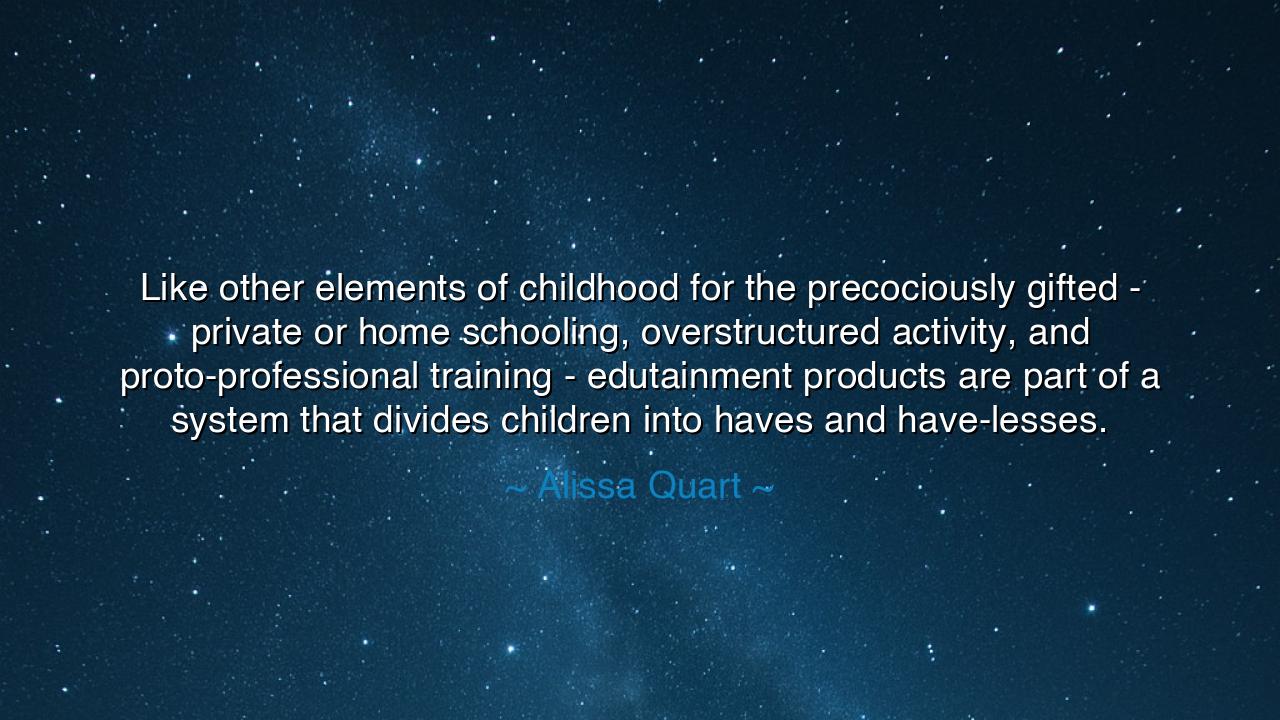
Like other elements of childhood for the precociously gifted -
Like other elements of childhood for the precociously gifted - private or home schooling, overstructured activity, and proto-professional training - edutainment products are part of a system that divides children into haves and have-lesses.






“Like other elements of childhood for the precociously gifted — private or home schooling, overstructured activity, and proto-professional training — edutainment products are part of a system that divides children into haves and have-lesses.” Thus spoke Alissa Quart, the keen observer of the modern world’s paradoxes — a voice that peers through the polished surface of progress to reveal the fractures beneath. In this reflection, she speaks not merely of toys, schools, or technology, but of a deeper malaise: the quiet, growing inequality of childhood itself. Beneath her words lies both sorrow and warning — that even innocence, which once united all children in the shared wonder of discovery, has now been stratified, measured, and sold.
When Quart speaks of “edutainment products,” she refers to the glittering tools of our time — the games, programs, and devices that promise to make learning effortless and fun. These are presented as miracles of modern education, bridges to brilliance for the next generation. Yet her insight cuts through this illusion: these tools, though cloaked in the language of opportunity, often deepen the gulf between those who have access and those who do not. Thus, in what seems an age of enlightenment, she uncovers a new form of division — one not of caste or race, but of resources and reach. The “haves and have-lesses” she names are not born of different abilities, but of different chances to unfold those abilities.
To understand her lament, we must look to the ancient principle of balance. The philosophers of old warned that when learning becomes a luxury rather than a birthright, a society’s harmony begins to unravel. In Athens, the schools of rhetoric and philosophy were open only to those of privilege, while the poor were left to the labor of hands rather than the cultivation of minds. Quart’s words echo this ancient truth — that knowledge, when monopolized, becomes a weapon of hierarchy. The modern world, though clothed in digital brilliance, risks repeating the errors of the past: building temples of wisdom that only the privileged may enter.
Consider the story of Horace Mann, the father of American public education. In the 19th century, he envisioned schools as the “great equalizer” — a place where the son of the farmer could stand beside the son of the banker, each given the same chance to learn. His dream was one of unity and fairness. Yet today, the dream flickers, dimmed by the forces of commercialization and competition. For every child surrounded by tutors, digital aids, and structured enrichment, there is another who learns from scarcity — whose curiosity struggles to survive without guidance or tools. Quart’s quote, then, is not cynicism but mourning: mourning for a world where even childhood has been divided into markets and metrics.
But her insight is not without hope. Within her warning lies a call to awaken conscience — to remember that education is not a commodity, but a covenant. A society that measures a child’s worth by the technology they can access has forgotten the essence of learning: wonder, play, and imagination. The greatest teachers — Socrates beneath the open sky, Confucius walking among his students, or Maria Montessori observing a child’s spontaneous discovery — all understood that wisdom cannot be sold, only nurtured. Quart asks us to reclaim that truth, to strip away the noise of overstructure and return to the simplicity of genuine growth.
Her phrase “overstructured activity and proto-professional training” speaks of another danger — the loss of childhood itself. In the quest to mold prodigies, we have forgotten to let children be. The ancient poets called childhood “the dawn of the soul,” a sacred time for dreaming and play. Yet in modern life, many children rise before dawn to lessons and schedules, their days filled with instruction but not imagination. Quart’s warning echoes like a bell: if we turn childhood into preparation for achievement rather than exploration of self, we raise not thinkers, but performers — not souls, but systems.
So, my children, learn from Alissa Quart’s wisdom. Guard against the illusion that more structure means more strength. Remember that the mind, like the soil, flourishes best when tended with care, not control. Share knowledge freely; let your children learn not only from devices, but from stories, from nature, from failure and wonder alike. Give them room to question, to play, to feel. For the measure of a civilization is not how much it teaches its privileged few, but how deeply it nourishes all of its young.
In the end, Quart’s words are not an indictment of progress, but a plea for compassion. Technology may dazzle, education may evolve, but the heart of learning remains human — it beats in curiosity, kindness, and the joy of discovery. If we forget this, we risk creating a world where brilliance belongs only to the fortunate. But if we heed her call, if we restore generosity to the act of teaching, then even the smallest gesture — a shared book, a patient word, a moment of wonder — becomes the seed of equality. And from such seeds, as the ancients taught, the truest civilizations are born.






AAdministratorAdministrator
Welcome, honored guests. Please leave a comment, we will respond soon